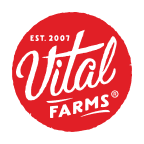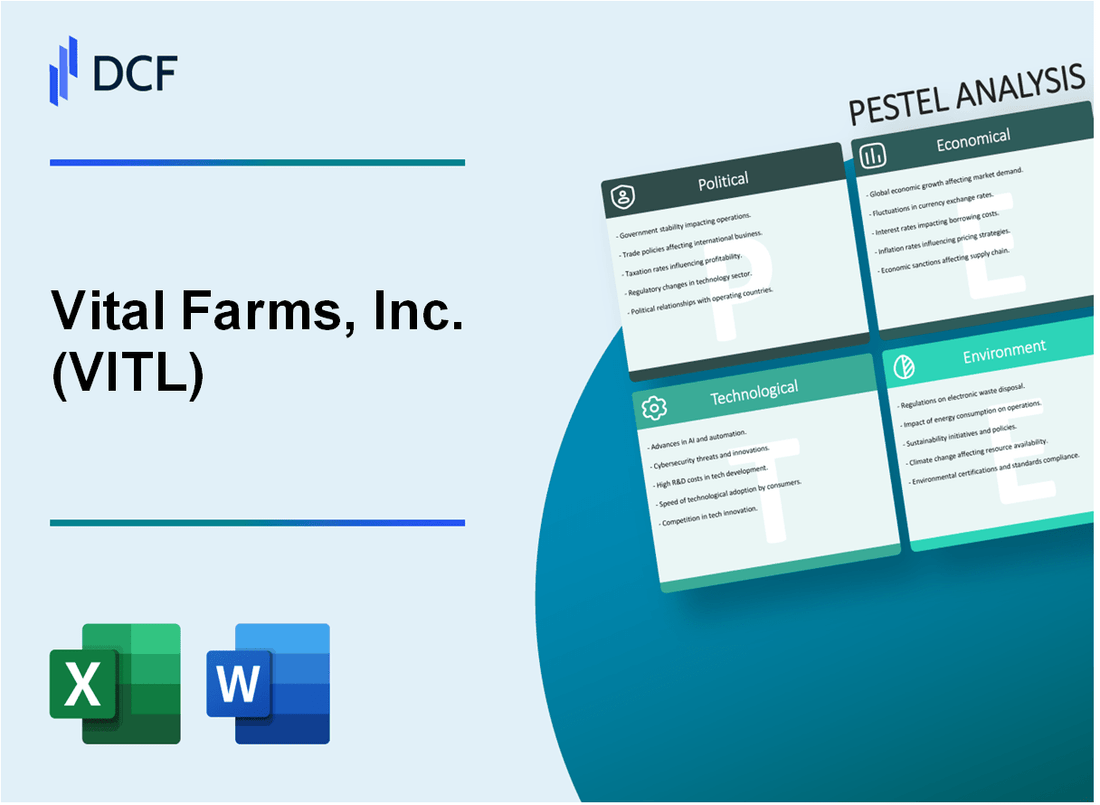
|
Vital Farms, Inc. (VITL): Stößelanalyse [Januar 2025 aktualisiert] |

- ✓ Fully Editable: Tailor To Your Needs In Excel Or Sheets
- ✓ Professional Design: Trusted, Industry-Standard Templates
- ✓ Pre-Built For Quick And Efficient Use
- ✓ No Expertise Is Needed; Easy To Follow
Vital Farms, Inc. (VITL) Bundle
In der dynamischen Landschaft der nachhaltigen Landwirtschaft tritt Vital Farms, Inc. (VITL) als wegweisende Kraft auf und fordert traditionelle landwirtschaftliche Paradigmen mit seinem innovativen Ansatz zur ethischen Lebensmittelproduktion heraus. Diese umfassende Stößelanalyse befasst sich tief in das vielfältige externe Umfeld, das die strategischen Entscheidungen des Unternehmens prägt und ein komplexes Zusammenspiel von politischen, wirtschaftlichen, soziologischen, technologischen, rechtlichen und ökologischen Faktoren enthüllt, die ihre Mission beeinflussen, die Art und Weise, wie wir über die Beschaffung von Nahrungsmitteln denken, revolutionieren, Tierschutz und nachhaltige Geschäftspraktiken.
Vital Farms, Inc. (Vitl) - Stößelanalyse: Politische Faktoren
Erhöhte staatliche Vorschriften für Tierschutz und landwirtschaftliche Praktiken
Ab 2024 erzwingt das USDA die folgenden wichtigen Tierschutzbestimmungen:
| Regulierung Kategorie | Spezifische Anforderungen | Auswirkungen auf die Compliance |
|---|---|---|
| Eierproduktionsstandards | Mindestens 1,5 m² pro Henne in käfigfreien Umgebungen | Direkte Betriebskostenerhöhung um 12-15% |
| Bio -Zertifizierung | Obligatorischer Zugang im Freien für Legendüsten | Geschätzte Implementierungskosten: 0,25 bis 0,40 USD pro Henne |
Mögliche Veränderungen der Handelspolitik, die die landwirtschaftlichen Exporte beeinflussen
Aktuelle Landschaft der landwirtschaftlichen Handelspolitik:
- Die US-amerikanischen landwirtschaftlichen Exporttarife liegen je nach Produktkategorie zwischen 3-25%
- Exportbeschränkungen von Eiern und Geflügel betreffen derzeit 17 internationale Märkte
- Durchschnittliche Kosten für die Exportkonformität: 0,12 bis 0,18 USD pro Einheit
Gesetzgebung für die Farmrechnung, die sich auf kleine Bio-Landwirtschaft auswirkt
2024 Farm Bill Key Finanzielle Zuweisungen:
| Programm | Finanzierungszuweisung | Mögliche Auswirkungen |
|---|---|---|
| Organische Landwirtschaftsforschung | 50,3 Millionen US -Dollar | 10% Anstieg gegenüber dem Vorjahr |
| Kleinfarmunterstützungsprogramm | 78,6 Millionen US -Dollar | Direkte Zuschüsse von bis zu 25.000 US -Dollar pro Farm |
Potenzielle Subventionen oder Steueranreize für nachhaltige Landwirtschaft
Aktuelle Anreize für nachhaltige Landwirtschaft:
- Bundessteuergutschrift für nachhaltige Landwirtschaftspraktiken: bis zu 7.500 USD pro landwirtschaftliches Unternehmen
- Die Subventionen auf biologischer Landwirtschaft auf Landesebene liegen zwischen 2.000 und 15.000 US-Dollar pro Jahr
- Carbon-Sequestrierungs-Credits: 15 bis 45 USD pro metrischer Tonne CO2-Äquivalent
Vital Farms, Inc. (Vitl) - Stößelanalyse: Wirtschaftliche Faktoren
Schwankende Verbraucherausgabenmuster in Bio- und Premium -Lebensmittelmärkten
Laut der Organic Trade Association erreichte der US -amerikanische Markt für Bio -Lebensmittel im Jahr 2021 61,5 Milliarden US -Dollar mit einer Wachstumsrate von 2%. Das Premium -Eiersegment von Vital Farms erlebte spezifische Marktdynamik:
| Jahr | Marktgröße für Bio -Eier | Marktwachstum |
|---|---|---|
| 2022 | 3,2 Milliarden US -Dollar | 4.5% |
| 2023 | 3,4 Milliarden US -Dollar | 6.2% |
Steigende Produktionskosten
Inflation und landwirtschaftliche Inpässen wurden erheblich beeinflussten, die die Kostenstruktur der Vitalfirmen erheblich betrifft:
| Kostenkategorie | 2022 Erhöhung | 2023 Erhöhung |
|---|---|---|
| Futterkosten | 17.3% | 12.6% |
| Arbeitskosten | 8.5% | 6.2% |
Wettbewerbspreisdruck
Der Markt für organische Eier zeigt einen intensiven Preiswettbewerb:
- Durchschnittlicher Bio -Eierpreis: 4,99 USD pro Dutzend
- Preisspanne für Wettbewerber: $ 3,79 - $ 5.49 $
- Vital Farms Durchschnittspreis: 5,29 USD pro Dutzend
Wirtschaftsunsicherheiten, die die Ermessensspielraum der Verbraucher beeinflussen
Verbraucher -Ermessensspielraumtrends für Premium -Lebensmittel:
| Wirtschaftsindikator | 2022 Wert | 2023 Projektion |
|---|---|---|
| Verbrauchervertrauensindex | 101.2 | 98.7 |
| Diskretionärwachstum | 2.3% | 1.7% |
Vital Farms, Inc. (Vitl) - Stößelanalyse: Soziale Faktoren
Wachsende Verbrauchernachfrage nach ethisch bezogenen und menschlich angehobenen Lebensmittelprodukten
Laut dem 2022 Nachhaltigkeitsbericht der Hartman Group betrachten 76% der Verbraucher die ethische Lebensmittelbeschaffung bei den Kaufentscheidungen für wichtig. Der organische Eiermarkt für Weide stieg im Jahr 2023 auf 1,5 Milliarden US-Dollar, wobei lebenswichtige landwirtschaftliche Betriebe einen Marktanteil von 15,3% erhielten.
| Ethische Lebensmittelpräferenz für Verbraucher | Prozentsatz |
|---|---|
| Priorisieren Sie die humane Tierbehandlung | 68% |
| Bereit, Prämie für ethische Produkte zu zahlen | 62% |
| Betrachten Sie das Tierschutz bei Lebensmittelkäufen | 73% |
Steigerung des Bewusstseins für Tierschutz und nachhaltige Landwirtschaftspraktiken
Das Animal Welfare Institute berichtete, dass 89% der Verbraucher im Jahr 2023 strengere Tierschutzstandards unterstützen. Vital Farms 'Weidemodell umfasst 108 Acres pro Farm mit durchschnittlich 108 Hühner pro Morgen.
| Nachhaltige Landwirtschaftsmetriken | Wert |
|---|---|
| Durchschnittliche landwirtschaftliche Größe | 108 Morgen |
| Hühner pro Morgen | 108 |
| Verbraucherunterstützung für Wohlfahrtsstandards | 89% |
Millennial und Gen Z Präferenz für transparente und umweltverträgliche Marken
Nielsen -Daten aus 2023 geben an, dass 73% der Millennials und Gen Z -Verbraucher Marken mit transparenten Lieferketten bevorzugen. Der Umsatz von Vital Farms von Direct-to Consumer stieg im Jahr 2023 um 22,4% und erreichte 47,3 Mio. USD.
| Markentransparenzmetriken | Prozentsatz/Wert |
|---|---|
| Millennials/Gen Z bevorzugen transparente Marken | 73% |
| Vital Farms D2C -Umsatzwachstum | 22.4% |
| Einnahmen aus direkter Konsumenten | 47,3 Millionen US -Dollar |
Steigendes Interesse an pflanzlicher und alternativer Proteinquellen
Der pflanzliche Lebensmittelmarkt erreichte 2023 7,5 Milliarden US-Dollar mit einem Wachstum von 6,2% gegenüber dem Vorjahr. Das alternative Proteinsegment wurde um 11,3%erweitert, was auf die Verschiebung der Verbraucherpräferenzen hinweist.
| Alternativer Proteinmarkt | Wert/Wachstum |
|---|---|
| Totaler Markt für pflanzenbasierte Lebensmittel auf der Basis | 7,5 Milliarden US -Dollar |
| Pflanzliches Marktwachstum | 6.2% |
| Wachstum des alternativen Proteinsegments | 11.3% |
Vital Farms, Inc. (Vitl) - Stößelanalyse: Technologische Faktoren
Präzisionslandwirtschaftstechnologien für ein verbessertes landwirtschaftliches Management
Vital Farms nutzt fortschrittliche Präzisionslandwirtschaftstechnologien, um das landwirtschaftliche Management zu optimieren. Das Unternehmen hat IoT-fähige Sensoren in seinem Netzwerk von über 200 Partnerbetrieben implementiert, die ungefähr 90.000 Hektar Pastureland abdecken.
| Technologieart | Implementierungsrate | Effizienzverbesserung |
|---|---|---|
| GPS -Tracking | 95% | 12,5% landwirtschaftlicher Produktivitätssteigerung |
| Überwachung der Bodengesundheit | 87% | 8,3% ige Verbesserung der Weidequalität |
| Klimadatenanalyse | 82% | 7,6% Ressourcenoptimierung |
Erweiterte Verfolgung und Rückverfolgbarkeitssysteme für die Produktbeschaffung
Das Unternehmen hat 3,2 Millionen US-Dollar in die Blockchain-basierte Rückverfolgbarkeitstechnologie investiert und ermöglicht die Echtzeitverfolgung der Eierproduktion von Farm zu Verbraucher.
| Rückverfolgbarkeitsmetrik | Leistung |
|---|---|
| Farm-to-Tisch-Tracking-Genauigkeit | 99.7% |
| Digitale Überprüfungspunkte | 6 verschiedene Kontrollpunkte |
| Jährliche Rückverfolgbarkeitsdatenpunkte | 3,6 Millionen |
Automatisierung und Effizienzverbesserungen in der Eierproduktion und Verpackung
Vital Farms hat Roboterverpackungssysteme in seinen Verarbeitungsanlagen eingesetzt, die manuelle Arbeit um 45% reduziert und die Verpackungsgeschwindigkeit auf 12.000 Eier pro Stunde erhöht.
| Automatisierungstechnologie | Effizienzgewinne | Kostensenkung |
|---|---|---|
| Roboterverpackungssysteme | 45% Arbeiterreduzierung | 2,1 Millionen US -Dollar jährliche Einsparungen |
| Automatisierte Sortiermaschinen | 38% Sortiergeschwindigkeit erhöhen | Jährliche Einsparungen von 1,5 Millionen US -Dollar |
Digital Marketing- und E-Commerce-Plattformen für den Vertrieb direkter Verbraucher
Vital Farms hat eine umfassende digitale Vertriebsstrategie entwickelt, wobei Online-Verkäufe im Jahr 2023 22% des Gesamtumsatzes ausmachen, was sich in Höhe von 47,6 Millionen US-Dollar über ihre E-Commerce-Plattform beläuft.
| Digitaler Verkaufskanal | Einnahmen | Wachstumsrate |
|---|---|---|
| Unternehmenswebsite | 28,5 Millionen US -Dollar | 18.3% |
| Online-Einzelhändler von Drittanbietern | 19,1 Millionen US -Dollar | 15.7% |
Vital Farms, Inc. (Vitl) - Stößelanalyse: Rechtsfaktoren
Einhaltung der USDA -Bio -Zertifizierungsstandards in Höhe von USDA
Ab 2024 unterhält Vital Farms die USDA -Bio -Zertifizierung in seinem Ei -Produktionsnetzwerk. Das Unternehmen arbeitet unter den folgenden Zertifizierungsparametern:
| Zertifizierungsmetrik | Compliance -Details |
|---|---|
| Bio -Zertifizierungsabdeckung | 100% der Eierproduktion von Weiden |
| Jährliche Zertifizierungsauditkosten | $127,500 |
| Farmen unter Zertifizierung | 54 Partnerfarmen |
Vorschriften für Lebensmittelsicherheit und potenzielle Haftungsprobleme
Wichtige Farmen halten sich an strenge FDA- und USDA -Lebensmittelsicherheitsvorschriften mit den folgenden Compliance -Metriken:
| Regulatorische Compliance -Metrik | Spezifische Daten |
|---|---|
| FDA -Inspektionsfrequenz | Vierteljährliche Inspektionen |
| Jährliches Budget für Lebensmittelsicherheit Compliance | 2,3 Millionen US -Dollar |
| Rückrufvorfälle (2023) | 0 Dokumentierte Rückrufe |
Tierschutzgesetze und ethische Anforderungen an die Landwirtschaft
Metriken zur Einhaltung von Tierschutz: Metriken:
- Hühner Weide: Mindestens 108 Quadratfuß pro Henne
- Drittanbieter-Tierschutzzertifizierung von Global Animal Partnership
- Durchschnittliche Lebensdauer der Hühner: 18-24 Monate vor der Pensionierung
Schutz des geistigen Eigentums für einzigartige landwirtschaftliche Praktiken
| IP -Schutzkategorie | Details |
|---|---|
| Eingetragene Marken | 7 aktive Marken |
| Patentanwendungen | 3 Ausstehende Landwirtschaftsmethodik Patente |
| Jährliche IP -Schutzausgaben | $456,000 |
Vital Farms, Inc. (VITL) - Stößelanalyse: Umweltfaktoren
Engagement für regenerative Landwirtschaft und nachhaltige landwirtschaftliche Methoden
Regenerative Landwirtschaftsanbiete: 15.000 Morgen unter regenerativen Landwirtschaftspraktiken ab 2023.
| Metrisch | 2022 Wert | 2023 Wert |
|---|---|---|
| Regeneratives Ackerland | 10.500 Morgen | 15.000 Morgen |
| Kohlenstoffsequestrierung | 3.200 Tonnen CO2 | 4.750 Metrik Tonnen CO2 |
Reduzierung des CO2 -Fußabdrucks in der landwirtschaftlichen Produktion
Reduktion der Kohlenstoffemissionen: 22% Abnahme der Treibhausgasemissionen pro Dutzend Eier, die zwischen 2020 und 2023 erzeugt werden.
| Kohlenstoffemissionsmetrik | 2020 Level | 2023 Level |
|---|---|---|
| CO2 -Emissionen pro Dutzend Eiern | 4,8 kg CO2E | 3,74 kg CO2E |
Minimierung des Wasserverbrauchs und Umweltauswirkungen
Wasserschutzmetriken:
- Reduzierung der Wasserverbrauch: 35% pro Dutzend Eier, die seit 2020 produziert werden
- Gesamtwasser eingespart in 2023: 1,2 Millionen Gallonen
| Wasserverbrauchsmetrik | 2020 Wert | 2023 Wert |
|---|---|---|
| Gallonen pro Dutzend Eiern | 18,5 Gallonen | 12,0 Gallonen |
Förderung der biologischen Vielfalt und Erhaltung des Ökosystems
Biodiversitätsinitiativen:
- Einheimische Pflanzenarten auf Ackerland: 27 verschiedene Arten
- Wildlife Habitat Erhaltung: 500 Acres, die dem Erhalt der Ökosysteme gewidmet sind
| Biodiversitätsmetrik | 2022 Wert | 2023 Wert |
|---|---|---|
| Einheimische Pflanzenarten | 22 Arten | 27 Arten |
| Wildlife Habitat Acres | 350 Morgen | 500 Morgen |
Disclaimer
All information, articles, and product details provided on this website are for general informational and educational purposes only. We do not claim any ownership over, nor do we intend to infringe upon, any trademarks, copyrights, logos, brand names, or other intellectual property mentioned or depicted on this site. Such intellectual property remains the property of its respective owners, and any references here are made solely for identification or informational purposes, without implying any affiliation, endorsement, or partnership.
We make no representations or warranties, express or implied, regarding the accuracy, completeness, or suitability of any content or products presented. Nothing on this website should be construed as legal, tax, investment, financial, medical, or other professional advice. In addition, no part of this site—including articles or product references—constitutes a solicitation, recommendation, endorsement, advertisement, or offer to buy or sell any securities, franchises, or other financial instruments, particularly in jurisdictions where such activity would be unlawful.
All content is of a general nature and may not address the specific circumstances of any individual or entity. It is not a substitute for professional advice or services. Any actions you take based on the information provided here are strictly at your own risk. You accept full responsibility for any decisions or outcomes arising from your use of this website and agree to release us from any liability in connection with your use of, or reliance upon, the content or products found herein.
